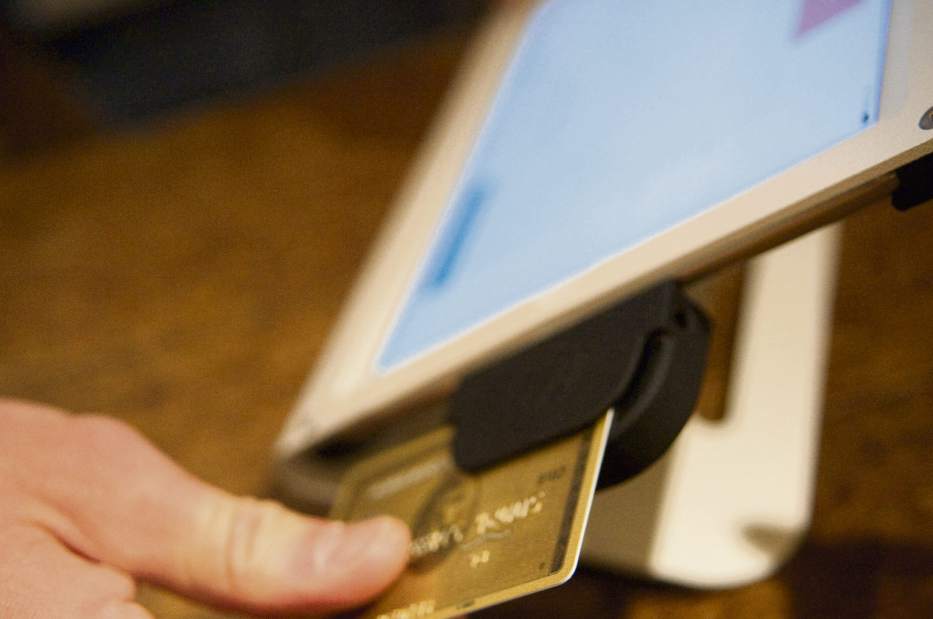https://archive.triblive.com/business/local-stories/small-stores-take-big-gamble-by-not-upgrading-credit-card-readers/
Small stores take big gamble by not upgrading credit card readers

Sidney Davis | Trib Total Media
Jamie McAdams swipes a credit card through the iPad at Von Walter & Funk on Sunday, Nov. 22, 2015. Vogel's business is not equipped to accept the new EMV 'chip' cards.
Nan Dowiak refuses to upgrade the credit card reader at her Lawrenceville toy store.
The frenzied holiday shopping season is not the time to be fumbling with a new payment system, she said.
“It's the one time of year I might have a line,” said Dowiak, owner of Dragonfly Castle Toys. “I pictured all of these people in their sweaty down coats with their anxious children, and said, ‘I'm not going to do this to people.' I pictured people getting frustrated and walking away.”
Sticking with the reader she has — one that can't read the more secure chip-enabled credit cards — could cost her. As of October, retailers that don't move to a chip card reader are liable for fraudulent purchases.
But she is not the only small-business owner holding off on the upgrade. The chip technology, known as EMV, makes it more difficult for thieves to replicate cards using stolen data. Most large retailers, such as Wal-Mart and Target, upgraded before an October deadline, when fraud liability in most cases shifted to merchants from card-issuing banks. But small-business owners have lagged far behind.
Just 29 percent of small-business owners surveyed by Wells Fargo several months ago said they would have chip-card systems in place by October. Those who put off the upgrade said they didn't believe the threat of fraud to be serious enough to justify the time and expense of upgrading during the holidays. Others said they would like to accept chip cards but have had technical problems with the new system or are still waiting to receive one from their credit card processing company.
These retailers are rolling the dice every time they swipe a card with a magnetic stripe, betting that the card isn't being used fraudulently. And yet, they are willing to gamble that their familiarity with customers and history of not being a target of fraud will see them safely through the holidays.
The holiday shopping season is immensely important to jewelers and can account for a third of a store's annual sales. Werner Jewelers in the Pines Plaza Shopping Center received a chip card system months ago but has been unable to make it function correctly, said manager Tim Gasper. So it has continued to use the magstripe machine.
Jewelers could be a target for fraud because they sell high-value items, but Gasper said his store has never been hit with a fraudulent charge since it opened in 1969.
“I think we've had two bounced checks,” Gasper said. “We're always pretty vigilant (with checking customer IDs).”
Shawn Aversa said he was eager to get a chip reader before opening his Lawrenceville gift boutique, Von Walter & Funk, in mid-October. A former PNC Bank employee, he was familiar with the shifting liability for credit card fraud.
Yet he is still swiping cards with the magstripe. Aversa uses the mobile payments provider Shopify, which allows small businesses to accept credit cards using their smartphone or tablet. But he said Shopify hasn't sent him a chip card reader yet.
“We kept calling them,” he said. “I kept thinking to myself, this (change to chip cards) is a huge project that has been under way for at least two years at PNC, so there's no way this is getting pulled.”
Aversa said he is not overly concerned. Shopify and its competitor, Square, said they will cover fraud-related losses for businesses who have ordered but not received the chip reader. The offer is stated on their websites, and Aversa said he was sure to get it in writing.
Yet small-business owners are taking a risk, said Jacob Rooksby, a law professor at Duquesne University.
“They have reason to be concerned,” Rooksby said. “If there's a major incident of fraud, those (processing) companies may not be standing by those agreements or readily doing so unless forced. They have the upper hand. They're bigger; they have more resources.”
Marissa Vogel is hoping Square lives up to its promises.
Vogel's lingerie store, Calligramme, has been open nearly a year in Lawrenceville, and she has never experienced any problems with fraud. She said she does not expect Square to go back on its word to cover fraud.
“I think it would be very bold of them to hold a small-business owner liable,” she said.
Square and Shopify began sending out chip card readers this week to business owners across the country, though many stores may not get them until after Christmas because of a backlog in orders.
A Square spokeswoman could not confirm whether the company had covered any losses related to fraud. Shopify spokesman Johnny Santilly said “the impact of any fraud-related losses incurred by merchants has been very minimal,” but he declined to give details.
Dowiak, who uses PayPal, is in no rush to upgrade her system. She doesn't believe the chip cards offer much better security against fraud, and she has no immediate plans to install one.
“I'm taking a wait-and-see attitude,” she said. “Let's see how it shakes out.”
Chris Fleisher is a staff writer for Trib Total Media. He can be reached at 412-320-7854 or cfleisher@tribweb.com.
Copyright ©2025— Trib Total Media, LLC (TribLIVE.com)
